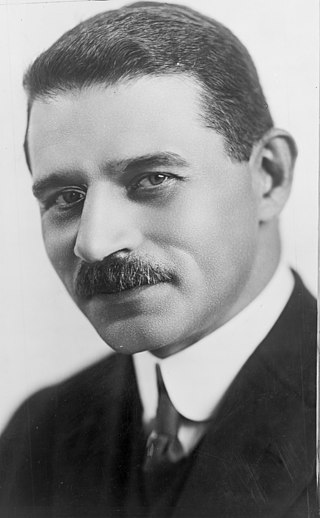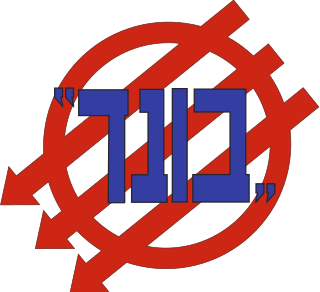Bund, BUND, or the Bund may refer to:

The International Workers Order (IWO) was an insurance, mutual benefit and fraternal organization founded in 1930 and disbanded in 1954 as the result of legal action undertaken by the state of New York in 1951 on the grounds that the organization was too closely linked to the Communist Party. At its height in the years immediately following World War II, the IWO reached nearly 200,000 members and provided low-cost health and life insurance, medical and dental clinics, and supported foreign-language newspapers, cultural and educational activities. The organization also operated a summer camp and cemeteries for its members.

Morris Hillquit was a founder and leader of the Socialist Party of America and prominent labor lawyer in New York City's Lower East Side. Together with Eugene V. Debs and Congressman Victor L. Berger, Hillquit was one of the leading public faces of American socialism during the first two decades of the 20th century.

Marek Edelman was a Polish political and social activist and cardiologist. Edelman was the last surviving leader of the Warsaw Ghetto Uprising. Long before his death, he was the last one to stay in the Polish People's Republic despite harassment by the Communist authorities.

The United Jewish People's Order is a secular socialist Jewish cultural, political and educational fraternal organization in Canada. The UJPO traces its history to the founding of the Jewish Labour League Mutual Benefit Society in 1926.
Yidisher Kultur Farband was a Communist-oriented organization, formed for preserving and developing Yiddish culture in Yiddish and in English, through an art section, a writers' group, reading circles, and publications. YKUF was founded in Paris in September 1937 by Jewish Communists and their supporters as an international body to disseminate ideology to the Yiddish-reading and Yiddish-speaking community.

The Sotsyalistishe Kinder Farband or SKIF was founded in Eastern Europe as the youth organisation of the Jewish Labour Bund, a Jewish Socialist political party. S.K.I.F has three core ideological principles: Chavershaft, Doikayt, and Yiddishkeit. The plural form of a SKIF member is Skifistn and the leaders who run SKIF are the Helfers, aged 18–20.

The Jewish Social Democratic Association Bund was a Jewish socialist organization in Bukovina, named after the Russian General Jewish Labour Bund.
The Jewish Socialist Verband (JSV) was a secular Jewish Yiddish-oriented organization founded in the United States of America in 1921 as a result of a political split in the Jewish Socialist Federation (JSF) regarding the Federation's position in support of the Bolshevik Revolution. With the disaffiliation of the JSF from the Socialist Party of America in 1921, the minority opposed to this formed the JSV, which became the SPA's Jewish language federation. Prominent members of the JSV at its foundation included Jacob Panken, Otto Branstetter, Benjamin Feigenbaum, Charles Solomon, Baruch Charney Vladeck, Alexander Kahn and Abraham Cahan.

The General Jewish Labour Bund in Poland was a Jewish socialist party in Poland which promoted the political, cultural and social autonomy of Jewish workers, sought to combat antisemitism and was generally opposed to Zionism.
Aliza Greenblatt was an American Yiddish poet. Many of her poems, which were widely published in the Yiddish press, were also set to music and recorded by composers including Abraham Ellstein, Solomon Golub, and Esther Zweig. They were also recorded by Theodore Bikel and Sidor Belarsky, among others. Greenblatt published five volumes of Yiddish poetry and an autobiography in Yiddish, Baym fentsṭer fun a lebn and her works include such well-known Yiddish songs as Fisherlid, Amar Abaye, and Du, Du.

(Chaim) Motl Zelmanowicz was a Bundist activist.

Yidish Natsionaler Arbeter Farband was an early Yiddish-speaking Labor Zionist landsmanshaft in North America, founded in 1912. Its official organ was the Yidishe Kempfer or Jewish Fighter, edited by Baruch Zuckerman. The Farband operated as a mutual aid society parallel to the political party Poale Zion, organizing cooperative insurance and medical plans and an extensive Yiddish and Hebrew educational system, as well as having developed in the 1920s a cooperative housing building in the Bronx, New York. The Farband even developed and maintained cemeteries for movement members. While mainly based in New York, the Farband was active throughout the United States and Canada, forming local chapters and summer camps in many cities with significant Jewish communities. The summer camp for the New York chapter was called Camp Kinderwelt, located in Upstate New York, and had an adjoining adults camp called Unser Camp. The Farband ran a network of secular schools in the US and Canada, called Folkshulen. In 1931 the Farband Yugnt Clubs, their youth wing, joined with Young Poale Zion to form the Young Poale Zion Alliance as the official youth wing of the entire Labor Zionist movement in America.
Skif or SKIF may refer to:

The Jewish left consists of Jews who identify with, or support, left-wing or left-liberal causes, consciously as Jews, either as individuals or through organizations. There is no one organization or movement which constitutes the Jewish left, however. Jews have been major forces in the history of the labor movement, the settlement house movement, the women's rights movement, anti-racist and anti-colonialist work, and anti-fascist and anti-capitalist organizations of many forms in Europe, the United States, Australia, Algeria, Iraq, Ethiopia, South Africa, and modern-day Israel. Jews have a history of involvement in anarchism, socialism, Marxism, and Western liberalism. Although the expression "on the left" covers a range of politics, many well-known figures "on the left" have been of Jews who were born into Jewish families and have various degrees of connection to Jewish communities, Jewish culture, Jewish tradition, or the Jewish religion in its many variants.

Poale Zion was a movement of Marxist–Zionist Jewish workers founded in various cities of Poland, Europe and the Russian Empire in about the turn of the 20th century after the Bund rejected Zionism in 1901.
Labor Zionism or socialist Zionism refers to the left-wing, socialist variation of Zionism. For many years, it was the most significant tendency among Zionists and Zionist organizations, and was seen as the Zionist sector of the historic Jewish labor movements of Eastern Europe and Central Europe, eventually developing local units in most countries with sizable Jewish populations. Unlike the "political Zionist" tendency founded by Theodor Herzl and advocated by Chaim Weizmann, Labor Zionists did not believe that a Jewish state would be created by simply appealing to the international community or to powerful nations such as the United Kingdom, Germany, or the former Ottoman Empire. Rather, they believed that a Jewish state could only be created through the efforts of the Jewish working class making aliyah to the Land of Israel and raising a country through the creation of a Labor Jewish society with rural kibbutzim and moshavim, and an urban Jewish Proletariat.
The Communist Union of Bielorussia and Lithuania was a short-lived Jewish communist organization in Bielorussia. It was founded as the Jewish Communist Party in Bielorussia on January 19, 1919. The Jewish Communist Party of Bielorussia functioned as an autonomous unit of the Communist Party (bolsheviks) of Bielorussia.

The General Jewish Labour Bund in Lithuania, Poland and Russia, generally called The Bund or the Jewish Labour Bund, was a secular Jewish socialist party initially formed in the Russian Empire and active between 1897 and 1920. In 1917 the Polish part of the Bund, which dated to the times when Poland was a Russian territory, seceded from the Russian Bund and created a new Polish General Jewish Labour Bund which continued to operate in Poland in the years between the two world wars. The majority faction of the Russian Bund was dissolved in 1921 and incorporated into the Communist Party. Other remnants of the Bund endured in various countries. A member of the Bund was called a Bundist.

Jacob Schaefer was a Russian-born Jewish American composer, political activist and choir director whose career ran from the 1910s to the 1930s. A committed Communist for the last two decades of his life, he founded and operated a number of workers' orchestras and choirs in Chicago and New York, including most famously the Freiheit Gezang Farein. He composed a number of cantatas, oratorios and song arrangements which were performed by the ensembles he directed, as well as by their affiliated performing groups around the United States.











